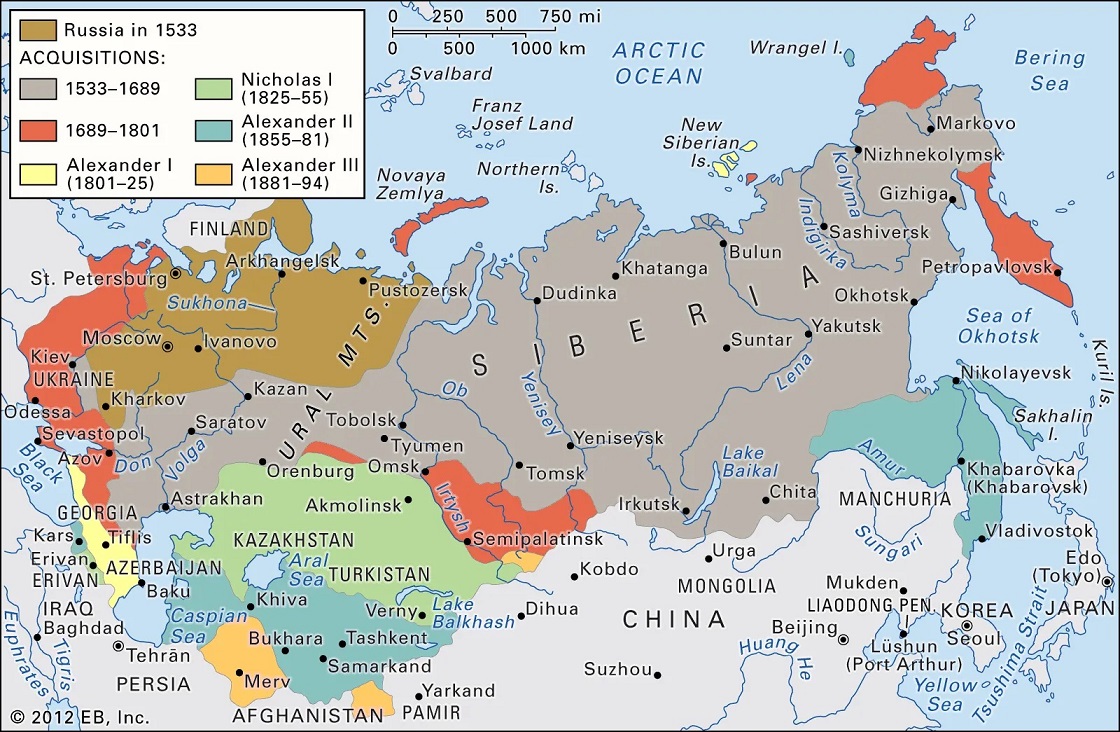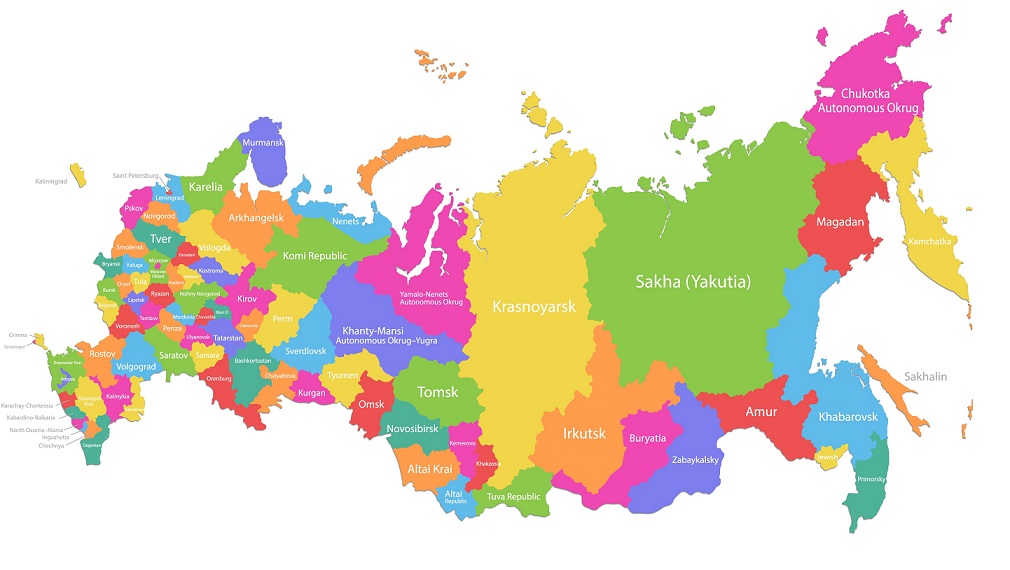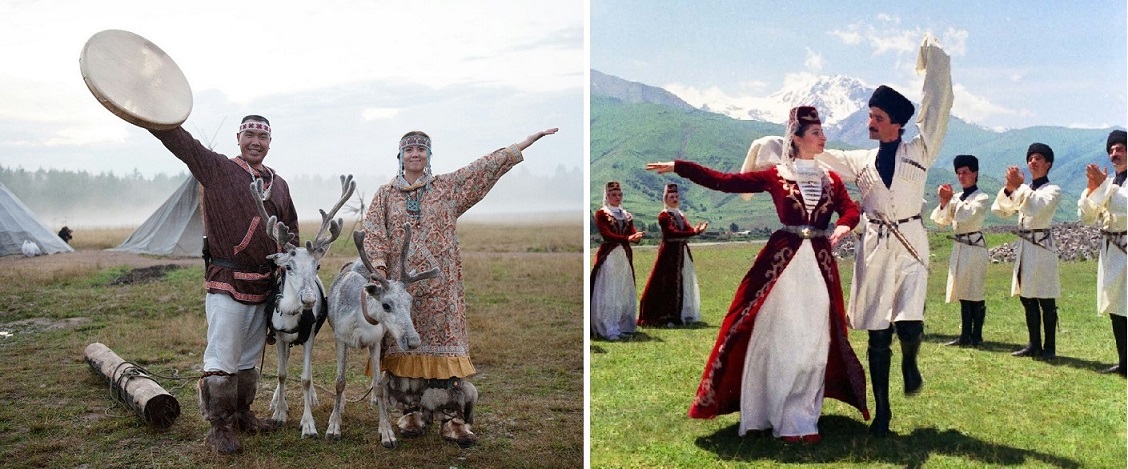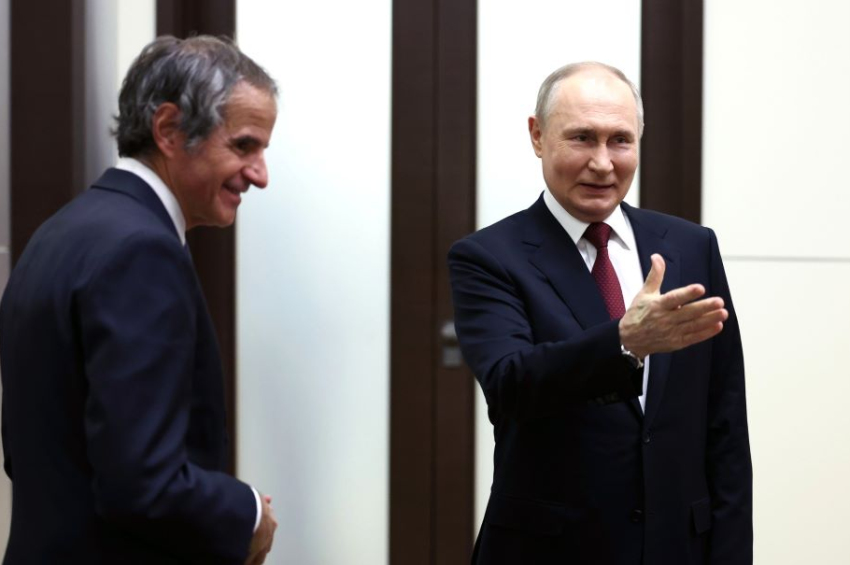What are the odds (and consequences) of Russia’s disintegration?
Founded in 1263 on the ruins of Kievan Rus, in the following 7 centuries, the Grand Duchy of Moscow subjugated vast territories in Europe and Asia, populated by hundreds of peoples and ethnic groups, mostly through violence and deceit. After two disintegrations 73 years apart, Russia still remains an empire spanning 11 time zones and stretching across two continents, with an area of over 17 million square kilometers and a population of 145 million representing over 200 different peoples and ethnic groups.

A map showing the expansion of the Russian Empire between 1533 and 1894.
Although many political experts and researchers previously spoke about the collapse of what remains of the Russian Empire and the Soviet Union as a likely outcome, the war President Vladimir Putin started against Ukraine in February 2022 has turned the probability into certainty.
Several experts in social-political sciences and international relations have discussed these matters.
Political analyst Taras Berezovets, founder of the Free Crimea project and the Institute for the Future of Ukraine, and president of the National Strategies Foundation, believes that Russia will exist within its current borders for another 2-4 years.

Taras Berezovets.
The world will witness the disappearance of the Russian state in its current form between 2024 and 2026, predicted the secretary of the National Security and Defense Council in Kiev. He argues that during the given period, the phenomena which the war in Ukraine has set in motion will intensify in the Russian Federation, drawing a comparison with the consequences of the war waged by the former Soviet Union in Afghanistan.
Russians will seek refuge, including in Ukraine
The Russian Federation itself emerged from the disintegration of the USSR without violence or loss of its own territories, but this time the scenario will be "much harsher," Berezovets believes. The analyst and Ukrainian official anticipates a civil war, with many casualties and refugees, and the breaking away of vast territories from the metropolis.
"From 5 to 10 million Russian citizens will try to cross the border into Ukraine in search of refuge," Berezovets said, referring to civilians caught in eventual hostilities in the European part of Russia, adding that most of them will seek political asylum and refugee status in European Union countries. "Ukraine needs to make the necessary preparations right now," the expert emphasized in an online interview.

An administrative map of the Soviet Union in 1989.
The collapse scenario is inevitable
Slovak publicist and politician Juraj Mesik is equally pessimistic about Russia. In a commentary for Ukrainian press, titled "Prepare for the Inevitable: Why the West Must Discuss the Collapse of the Russian Federation Now," Mesik outlines a lasting Balkan scenario for the current Russian empire.
The Slovak expert, who is the director of the Slovak Foreign Policy Association, wrote in an essay six years ago that Russia might not survive after 2031, but the war has adjusted his forecast. In his most recent statements, he has already spoken about 3-5 years. After the disintegration, some territories will return to the countries from which they had been taken.
Karelia will seek reunification with Finland, Buryatia will approach Mongolia, the Kuril Islands will return to Japan, Georgia's authority will be restored in Abkhazia and South Ossetia, Moldova will regain Transnistria, and Ukraine will free Crimea and Donbas.

Juraj Mesik
The Kaliningrad region could become the subject of discussions for its return to one of the EU countries, and China will be very interested in the regions of Khabarovsk and Amur, the expert notes. The native peoples of Siberia will have the opportunity to achieve sovereignty and independence after more than 500 years of domination by the Russians. Chechnya, Dagestan, Ingushetia, and other Caucasian republics will be among the first to break away.
Even the regions in the Far East and the Urals, predominantly populated by Russians, will no longer want to have anything to do with Moscow, Mesik opined.
"There will be times of poverty and famine [for Russians]," said the same source, noting that the hottest topic for the EU - and the world as a whole - will be securing Russia's nuclear arsenal.
Any successor will be contested
American businessman and social activist Michael Rubin approached the issue of Russia's disintegration from a different perspective. In an analysis for the American Enterprise Institute, he reminds readers that former President Boris Yeltsin left behind a weak and flawed institutional infrastructure that, despite its shortcomings, was still a system upon which the state could go on developing.

Michael Rubin
The current Kremlin leader has destroyed even the little that his predecessor had built: independent press no longer exists, independent judiciary no longer exists, and even parliament - as a forum for debate and lawmaking workshop - no longer exists. By concentrating all power in the hands of a single person who is both legislator, executor, and judge, he has become the only institution that matters, warns the author, and with his death, the entire structure built by Putin will collapse.
The system that requires competent individuals is staffed exclusively with loyal officials without initiative or responsibility, so the eventual disappearance of Putin will create a huge power vacuum, but there will be no individuals with enough authority and respect for citizens to follow.
"Putin has cleaned up everything around him, so that there are no competitors. And this is the big problem [...] When Putin dies, Russia will sink into chaos," warns Rubin, specifying that the eventual appointment of a successor will be futile anyway because it will be contested by power-hungry KGB generals.
He expressed his conviction that the chaos will be followed by a division of the Russian Federation between former Soviet republics that will want to reclaim occupied territories, on the one hand, and the federal republics within Russia, on the other hand.

A map showing the administrative-territorial division of Russia today.
Risks of extremism
Editorialists from Talk Diplomacy, Al Jazeera, and The Economist also look at scenarios of Russia's collapse. The three publications warn that the disintegration of the country will be a tragedy for Russians, and the imposition of reparations for the occupation of foreign territories and aggression against other countries could give rise to revanchist, far-right movements that may attempt to seize control of nuclear weapons.
If the European part of the country manages to form a democratic state and rebuild with the help of the West, while the other parts become independent states, such an evolution will be a great success for the civilized world.
Society in the Russian Federation is highly diverse and heterogeneous. Diversity is manifested in different languages, cultures, and religions. Even the way of life is different – for example, the Chukchi people remain a pastoral and fishing community, while the Chechens have maintained a clan-based structure composed of large families, unlike ethnic Russians in the European part of Russia who have adopted a Western lifestyle.

Chukotka and Chechnya are different in terms of ethno-cultural, economic, and religious aspects.
Economically, the differences are equally significant: the western regions are more industrialized than the autonomous republics in the east, which, however, are rich in natural resources.
The significant differences between the peoples and ethnicities in Russia could be a strong motive for them to desire separate national states from other peoples and ethnic groups.
Although called a "federation," Russia is, in reality, a unitary state where the center controls the provinces with an iron fist, draining them of resources without giving much in return and without caring about the indigenous peoples or the environment. This governance model has its roots in the early medieval times, and due to the resources captured from neighbors, Russians have rarely felt the need to innovate.
It is not surprising, under these conditions, that Russian regions view Moscow as a burden and exploiter, sharing feelings of fear and mistrust.
Two major disintegrations
"Greater Russia" has experienced two major disintegrations in its history. The first occurred after the Bolshevik coup in 1917, when the country descended into unprecedented terror, followed by its recovery of most lost territories and another bloodbath during the Stalinist period.
In 1989, the Soviet empire was weakened by military conflict and collapsed under the burden of economic difficulties, allowing the union-making republics to depart peacefully (with a few exceptions – Moldova lost Transnistria, Georgia lost South Ossetia, and Azerbaijan and Armenia fought over Nagorno-Karabakh).
After about 100 years and 30 years, respectively, since those events, history is at risk of repeating itself. Many will applaud such a development, but do not rush to draw a map of future Russia. The fate of the empire – and probably the world – will be decided by those who control the country's nuclear arsenal.
"No Putin, no Russia," once famously said Vyacheslav Volodin, speaker of the lower house of parliament in Moscow. And Putin himself asked bluntly before ordering the invation of Ukraine, "What's the point of a world without Russia?"
***
A note from the writer: forgive me, for I am not a native English speaker. If you want to support me, please donate to my small publication at Banca Transilvania (Romania): euro account RO50BTRLEURCRT0490900501, for Rudeana SRL. Any amount is welcome. Thank you.







